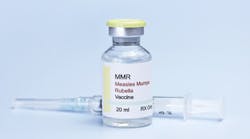Can new research break the anti-vaccine sentiment?
The anti-vaccine fear—fueled by celebrities like Jenny McCarthy and Robert F Kennedy, Jr.—places childhood vaccinations in an impassioned debate (1). What will it take for people to understand that vaccines are necessary and part of preventing illness? New research studies have been published with great support for vaccines; two states have made legislative progress towards ending philosophical and religious exemptions in which individuals can choose not to participate in vaccination programs on the basis of fear and misinformation.
READ MORE | The Autism Experience: Helping practice families deal with autism
Vaccines have been proven effective and safe, regardless of some individuals and groups’ anti-vaccine opinions. The lay press and anti-vaccine people share an opinion that can mean life or death—not only to their families, but to others as well. Those that are anti-vaccine often do not vaccinate their children, putting those around them at risk, such as children or adults that cannot be vaccinated due to age or a medical problem.
According to a Time magazine article, anti-vaccine attitudes lead to a recent occurrence of measles was initiated by a single unvaccinated guest in Disneyland, and an outbreak of mumps in and around Columbus, Ohio. (2) An immune-compromised woman—who was dependent on the protection that a well-vaccinated community should afford to its few unvaccinated members—recently died of measles in Washington State. This was the first US measles death in over a decade. The good news is that a recent nationwide poll conducted by the University of Michigan’s CS Mott Children’s Hospital established that parents’ views on vaccines are changing in favor of vaccines. (2)
Measles and immunosuppression
A recent study explained the long-term benefits of the measles vaccination in preventing infectious disease, including lifelong protection against this pathologic virus. (3) Mina et al. analyzed data collected since mass vaccination began in high-income countries, a time when measles was common. Measles vaccination is less deadly than other childhood infections. It also causes temporary immunosuppression, but review of the data suggests that it disables immune memory for two to three years. (3) We know that vaccination protects children and adults from acquiring measles. According to the authors of this study, it also prevents infections that may be opportunistic due to the immunocompromised status of individuals, and stops other infections taking advantage of measles-induced immune damage. (3) In other words, those infected may become more susceptible to other infections even after measles has abated, due to reduction of B and T lymphocytes. (3) The previously infected people are often susceptible to “opportunistic infections for a period of several weeks to months.” (3) This is not the case for vaccinated individuals. The researchers estimate that when measles was widespread, it contributed to as many as half of all childhood deaths from infectious disease in industrialized countries. (4)
READ MORE | Inside Knowledge: Cervical cancer
2010 measles outbreak in British Columbia
In a study in the Journal of Infectious Diseases, scientists at the University of British Columbia and the BC Centre for Disease Control used genetic sequencing to trace the 2010 measles outbreak, connecting it to the arrival of visitors during the Winter Olympics. (5) According to the study authors, the genomic data showed that all the measles cases in northern BC arose from a single exposure and introduction. (6)
The results of widespread herd immunity can be unexpected. In a Lancet study, researchers found “that negative outcomes are 4.5 times worse for measles, 2.2 times worse for chickenpox, and 5.8 times worse for rubella than would be expected in a pre-vaccine era in which the average age at infection would have been lower”. (7) They stress that by not vaccinating in a largely vaccine-protected community, the non-vaccinated are exposed to the greatest negative outcomes for many preventable diseases. (7) In a Lancet editorial, the author stated that “vaccines not only protect those who accept them, but they can also make health outcomes worse for those who do not.” (8) In other words, higher vaccination rates that approach herd immunity levels cause a smaller number people to become ill. However, those who do get the disease have much more severe illnesses, including death, than in previous in previous decades. (8)
READ MORE | Measles: Resources for dental professionals
Reducing the risk
If not vaccinating children places others at risk, what can be done about this problem? In the legislative arena, the California Senate and the Vermont House voted to end philosophical exemptions. (9, 10) In California, parents who do not vaccinate their children need to home-school them, unless there is a medical reason not to vaccinate. The main reason for the vote to end philosophical exemptions is that more children are not receiving vaccinations in spite of their safety, endangering the public. 48 states, with the exception of Mississippi and West Virginia, allow either philosophical or religious exemptions. (10)
An article in the journal Pediatrics stated that the United States should reconsider allowing vaccination exemptions for internationally adopted children unless there are factual medical contraindications to vaccination. (11) This occurred after measles was diagnosed in three recently adopted, special needs children with cerebral palsy from China. The authors also stated that US pediatricians should advise adopting parents to confirm that their child is current on recommended vaccinations before coming to the United States. (11)
In other news, an experimental shingles vaccine from GlaxoSmithKline (GSK) is effective across all age groups. Shingles is caused by the varicella-zoster virus, the same virus that causes chickenpox. (12) Merck has Zostavax, a live attenuated virus vaccine. According to Reuters, the new GSK vaccine combines a protein found on the virus that causes shingles with a booster, which is intended to augment the immunological response. (12) Zostavax is said to be less effective among people who are 70 years or older.
For those that are needle-phobic, a new patch could eliminate the need for needles and allow people to administer the flu and other vaccines to themselves. (13) Researchers at the increase the Georgia Institute of Technology feel it would increase the number of people receiving flu shots. (13)
A study of over 26,000 girls shows that the human papillomavirus (HPV) vaccine benefits can be seen in high school girls. (14) Even before the HPV vaccine prevents women from getting cervical cancer, it protects against genital warts and cervical dysplasia, new research suggests. Another new study offers more evidence that the initiation of vaccines to fight HPV could reduce cervical cancer in American women. (15) The reduction could also be the result of changes made to cervical cancer screening recommendations in recent years, according to Susan Hariri of the U.S. Centers for Disease Control (CDC) and Prevention. (15) Teen boys and girls who are 11 or 12 years old should get the three-dose series of HPV vaccine to protect against HPV, according to the CDC. (16)
Many fear that vaccinations will harm their children or themselves. In fact, very few will be harmed, and those few can receive a medical exemption. Parents and caregivers should educate themselves and move beyond the fear that can cause harm not only to their children, but to many others as well.
References
1. Kluger J. That Moment When You Must Have a Word with Jenny McCarthy. Time. http://time.com/60416/jenny-mccarthy-anti-vaccine-whitewash/. Published April 12, 2014. Accessed July 10, 2015.
2. Kluger J. Why Science Is Winning the Vaccine Wars. Time. http://time.com/3947855/vaccine-poll-antivaxxers. Published July 7, 2015. Accessed July 10, 2015.
3. Mina MJ, Metcalf CJ, de Swart RL, Osterhaus AD, Grenfell BT. Long-term measles-induced immunomodulation increases overall childhood infectious disease mortality. Science. 348:694-699. doi: 10.1126/science.aaa3662.
4. Bakalar N. Measles May Increase Susceptibility to Other Infections. New York Times blog. http://well.blogs.nytimes.com/2015/05/07/measles-may-increase-susceptibility-to-other-infections/?_r=1. Published May 7, 2015. Accessed July 10, 2015.
5. University of British Columbia. Tracking measles cases introduced to British Columbia during the 2010 Games. ScienceDaily. www.sciencedaily.com/releases/2015/07/150707120210.htm. Published July 7, 2015. Accessed July 10, 2015.
6. Gardy JL, Naus M, Amlani A, et al. Whole-Genome Sequencing of Measles Virus Genotypes H1 and D8 During Outbreaks of Infection Following the 2010 Olympic Winter Games Reveals Viral Transmission Routes. J Infect Dis. July 2015. doi: 10.1093/infdis/jiv271.
7. Fefferman NH, Naumova EN. Dangers of vaccine refusal near the herd immunity threshold: a modelling study. Lancet Infect Dis. Published online 14 May 2015. http://dx.doi.org/10.1016/S1473-3099(15)00053-5.
8. Breweremail NT and Moss JL. Editorial. Herd immunity and the herd severity effect. The Lancet Infectious Diseases. Published Online: 14 May 2015. DOI: http://dx.doi.org/10.1016/S1473-3099 (15)00054-7.
9. Reuters. California Senate Votes to End Beliefs Waiver for School Vaccinations. The New York Times.http://www.nytimes.com/reuters/2015/05/14/us/14reuters-usa-measles-vaccinations.html. Published May 14, 2015. Accessed July 9, 2015.
10. http://finance.yahoo.com/news/vermont-house-votes-end-philosophical-233009031.html.
11. Su Q, Zhang Y, Ma Y, et al. Measles Imported to the United States by Children Adopted From China. Pediatrics Vol. 135 No. 4 pp. e1032 -e1037. Published online March 2, 2015. April 1, 2015. (doi: 10.1542/peds.2014-1947)
12. GSK shingles vaccine shows benefits across all age groups. Reuters. http://www.reuters.com/article/2015/04/28/us-health-shingles-gsk-idUSKBN0NJ14920150428. Published April 28, 2015. Accessed July 9, 2015.
13. Slap on a Flu Patch? New Vaccine Would Skip the Needle. NBC News. http://www.nbcnews.com/health/health-news/slap-flu-patch-new-vaccine-would-skip-needle-n40726. Published February 28, 2014. Accessed July 9, 2015.
14. Kaplan K. Benefits of HPV vaccine can be seen in high school girls, study says. The LA Times. http://www.latimes.com/science/sciencenow/la-sci-sn-hpv-vaccine-gardasil-works-fast-teens-20150427-story.html. Published April 27, 2015. Accessed July 10, 2015.
15. Jennifer Wu, M.D., obstetrician-gynecologist, Lenox Hill Hospital, New York City; Linus Chuang, M.D., professor of obstetrics, gynecology and reproductive science, Icahn School of Medicine at Mount Sinai, and gynecologic oncologist, Mount Sinai Hospital, New York City; Cancer, news release, June 22, 2015.
16. HPV Vaccines. The Centers for Disease Control and Prevention website. http://www.cdc.gov/hpv/vaccine.html. Updated January 26, 2015. Accessed July 10, 2015.


